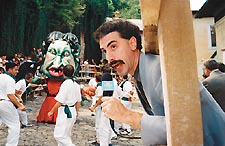Social Study
Hilariously inappropriate, 'Borat' turns out to be a comic goose that keeps laying one golden egg after another
Rarely have I heard an audience erupt in the manner in which they did during a key scene in Borat. An explosive startled laughter quickly grew to a deafening roar as Borat (Sacha Baron Cohen) and his alarmingly obese producer Azamat (Ken Davitian), engaged in an anger-stoked fit of nude, no-holds-barred wrestling in their hotel room. It’s one of the few ”scripted” moments in Borat, but, like the rest of the film, it gains comic momentum from a combination of shamelessness, anything-goes improvisation and gross-out, all-out inappropriateness. The two naked men wind up first in an elevator with other startled hotel guests before continuing their tirade in the lobby and beyond. Watching it, you realize that there is nothing — nothing — Baron Cohen won’t do for his art.
If you haven’t heard the buzz about Borat yet, you will. And when the movie hits theaters this Friday, that buzz will likely be deafening. Spinal Tap changed the comic landscape of movies 20 years ago. Borat raises the ante, blending the mockumentary form with a Candid Camera aesthetic and an extreme, fearless level of performance art, creating a glorious and profound new kind of comedy experience. It’s an experience that Baron Cohen — no matter how successful Borat turns out to be — will never be able to repeat, since much of the humor is derived from people not realizing they’re the butt of the joke.
 Cohen as Borat |
The movie’s official title is Borat: Cultural Learnings of America for Make Benefit Glorious Nation of Kazakhstan, and the film orbits around Borat Sagdiyev, a TV reporter for a remote Kazakh village. Refreshingly good natured and eager to learn new things, Borat has come to America with his producer Azamat, a camera crew, a chicken and ”a jar of gypsy tears to protect me from AIDS,” to find out what makes America great. What he finds is a heady mixture of polite and bemused, hostile and racist, misogynist and malcontent. The perspective is one of an outsider looking in, reflecting a mirror back on our society.
Borat’s shoot is supposed to be confined to New York, but the host, who despite his sexually aggressive manner and blatantly offensive outbursts, maintains a giddy, appealing innocence, becomes obsessed with Pamela Anderson after catching a rerun of Baywatch. He decides to travel to California to find her and make her his bride.
So across America the crew goes, in an old ice cream truck. Along the way, Borat stops at a Virginia rodeo where he mangles the National Anthem; takes lessons in Southern etiquette culminating in an outrageously funny Southern dinner party; encounters a group of testosterone-primed, drunken frat boys; stays at a bed and breakfast run by an elderly Jewish couple; and finds Jesus at a Pentecostal revival. He eventually meets Pamela Anderson in a climax that is as unexpected as it is riotously funny.
The goof here is that Baron Cohen and director Larry Charles (Curb Your Enthusiasm) don’t let the subjects Borat encounters in on the joke. Everyone is lead to believe he’s a well-intentioned, English-mangling foreigner. Most do their best to accommodate his unfamiliarity with our culture and to patiently learn about his. Inevitably, however, his conversations with folks — if they haven’t run away screaming — disintegrate into smoldering fits of fury from the receiving party. When Borat meets with a group of feminists, for instance, and cheerily reports that the women in his country are kept in cages, one of the women storms out of the room.
Baron Cohen never breaks character. And when you consider the amount of footage shot that wasn’t used in the final 90-minute cut, the mind boggles at Baron Cohen’s remarkable, obsessive commitment to his craft.
Borat was devised as a supporting character on Baron Cohen’s Da Ali G Show. Provided the spotlight, however, he turns out to be a comic goose that keeps laying one golden egg after another. The movie begins with Borat giving us a brief introduction to his village. It’s the only time in which the movie abandons its guerilla tactics, but it sets the tone, providing a comic base for everything to come. We meet the village rapist, Borat’s sister (”the number four prostitute in all of Kazakhstan”), and town’s mechanic, who also serves as its abortionist. We meet Borat’s wife, who spews language that would make a trucker blush. We’re shown footage from the village’s traditional ”Running of the Jew,” setting up an anti-Semitic tenor that will wind its way through the movie, providing several of its funniest moments, as well as its most disturbing.
The CIA World Factbook cites the issues of Kazakhstan (the world’s ninth largest country, it borders Russia and China) as ”developing a cohesive national identity; expanding the development of the country’s vast energy resources and exporting them to world markets; achieving a sustainable economic growth outside the oil, gas, and mining sectors.” Borat sums up the Kazakhstan’s problems more succinctly: ”Economic, social and Jew.”
It’s upsetting, yes, but it’s clearly meant to provoke us (and it should be noted that Baron Cohen is Jewish, as is director Charles). Borat’s idea of a Jew is carved from old world myth — money-grubbing, horned, egg-laying creatures with the ability to shift shapes. When, during their American sojourn, Borat and Azamat realize they’re in a Jewish-run bed and breakfast, they become visibly terrified (their sweet, attentive hosts remain oblivious), and Baron Cohen executes a flawless Blair Witch Project parody, horrified that ”one of the Jews has taken the shape of a very old woman!”
It sounds shocking, and at times it is. But it’s so far over the top, it ceases to be offensive. Genuinely shocking, however, are the spontaneous responses Borat gets out of ordinary people. Asking a gun shop owner what kind of firearm is good for hunting Jews, the redneck doesn’t even blink, instantly recommending a nine-millimeter as the weapon best suited for the job. At the rodeo, Borat, who is an oversexed fellow to boot, mentions to an organizer that in his village they hang homosexuals. ”That’s what we’re trying to get done here,” comes the offhand reply.
 Area Showtimes BORAT Starring Sacha Baron Cohen Rated R 90 minutes Opens Nov. 3 Area theaters |
These instances, along with countless others, reveal the dark side of America. It’s a full-frontal exposure of the ignorance that, even in these modern times, runs rampant through our society. The satire is primal, real and revealing — it opens our eyes as it makes us convulse from laughter.
Borat is not all satirical barbs, but it is consistently crazy — and crazy funny. Even a visit to an antique store turns for Borat (and for the helpless and hapless store owner) into a slapstick-driven crisis of legendary proportions. Borat take a few easy rim shots at the expense of low-level political celebrities, including former Congressman Bob Barr and former presidential candidate Alan Keyes. But most of the time Borat involves the everyday citizen, whether that means greeting men with a traditional triple kiss (two on the cheek, one on the lips) or asking a bemused driving instructor to be his boyfriend. The gags detonate with small bursts, but many have huge, explosively funny payoffs, such as that Southern dinner party where Borat gets a lesson from the hostess in the proper use of toilet paper.
One of the most uproarious, outrageous, and sophisticated social satires ever made, Borat isn’t suited to all tastes. Those who are easily offended might as well steer clear — they won’t enjoy what they see. And they almost certainly won’t understand why everyone else around them is having such a rip-roaring good time.
Support Metro Weekly’s Journalism
These are challenging times for news organizations. And yet it’s crucial we stay active and provide vital resources and information to both our local readers and the world. So won’t you please take a moment and consider supporting Metro Weekly with a membership? For as little as $5 a month, you can help ensure Metro Weekly magazine and MetroWeekly.com remain free, viable resources as we provide the best, most diverse, culturally-resonant LGBTQ coverage in both the D.C. region and around the world. Memberships come with exclusive perks and discounts, your own personal digital delivery of each week’s magazine (and an archive), access to our Member's Lounge when it launches this fall, and exclusive members-only items like Metro Weekly Membership Mugs and Tote Bags! Check out all our membership levels here and please join us today!





















